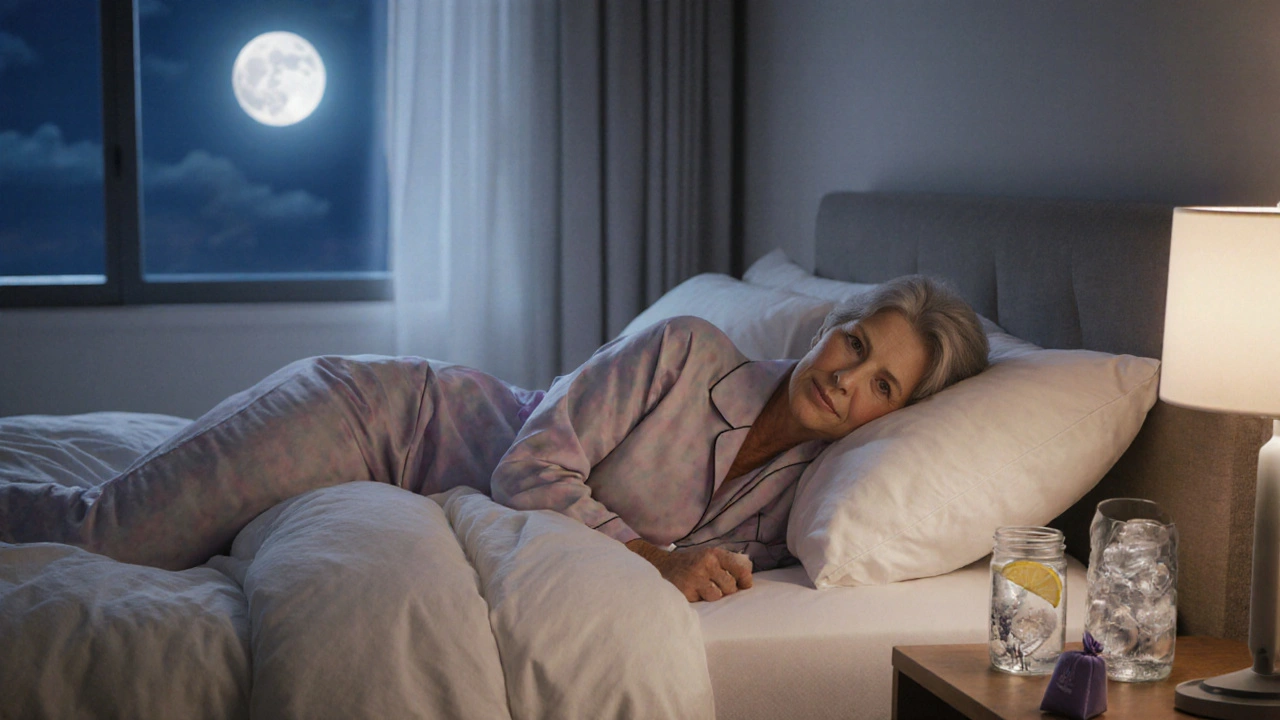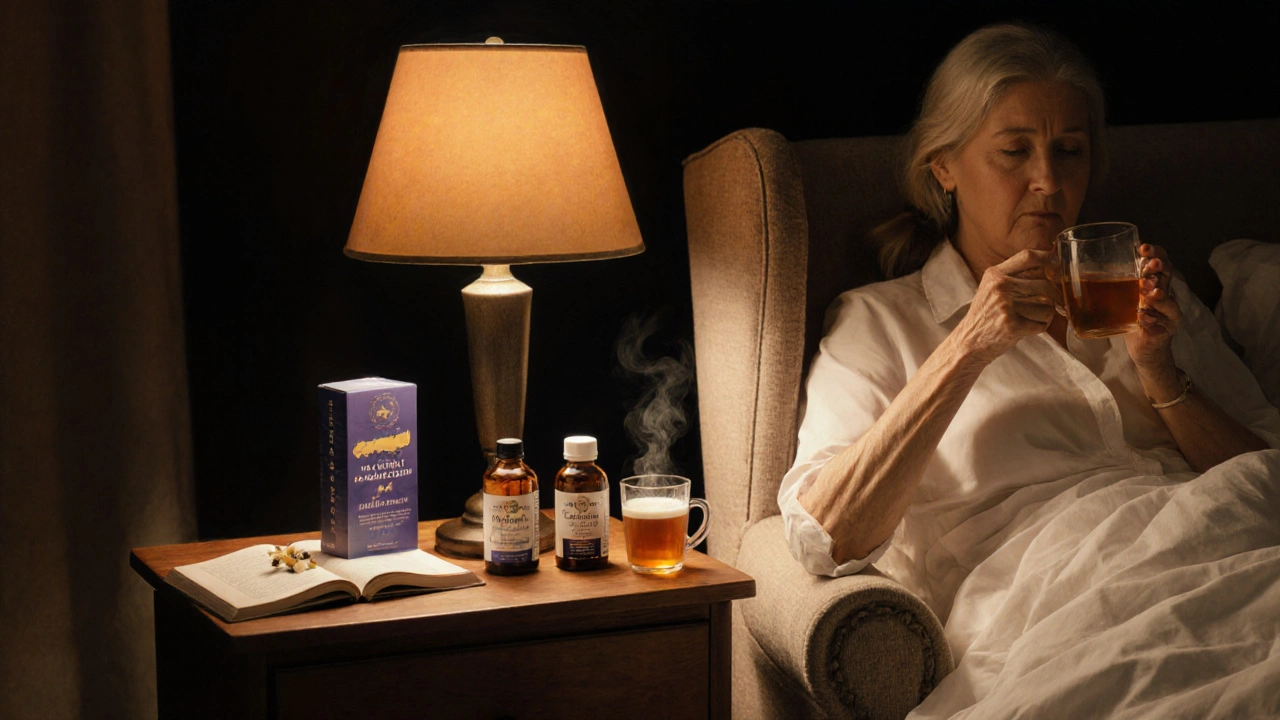Menopause Sleep Tips: How to Get Better Night's Rest
 Sep, 21 2025
Sep, 21 2025
Menopause Sleep Tracker & Tips
Track your sleep patterns and get personalized tips based on your symptoms.
When Menopause is the natural transition that ends menstrual cycles, typically occurring between ages 45‑55 hits, many women notice their sleep the nightly period of rest that supports brain and body recovery getting harder to achieve. Night sweats, racing thoughts, and a shift in hormone levels can turn a once‑peaceful bedtime into a nightly guessing game.
Quick Take
- Keep your bedroom cool, breathable, and use a fan to combat night sweats.
- Skip caffeine after 12p.m. and keep dinner light and protein‑rich.
- Gentle evening movement-like yoga or a short walk-helps deepen sleep.
- Magnesium, melatonin, or a few drops of lavender oil can ease the transition to rest.
- If insomnia lingers, talk to a health professional about low‑dose hormone therapy or CBT‑I.
Why Sleep Disrupts During Menopause
The hormonal roller coaster of menopause mostly revolves around dropping estrogen and progesterone. Both hormones play a role in regulating the body’s internal clock, so when they dip, the sleep‑wake cycle can wobble.
One of the most common culprits is Hot Flashes sudden waves of heat often accompanied by sweating and a rapid heartbeat. They tend to strike in the evening, raising core body temperature just enough to wake you up or prevent you from falling asleep in the first place.
Stress, mood swings, and an overactive mind are also frequent guests. The brain’s "fight‑or‑flight" response stays on high alert, making it harder to unwind.
Temperature Control and Bedtime Environment
Heat is the biggest sleep‑enemy during menopause. Aim for a bedroom temperature between 60‑66°F (15‑19°C). A small fan or portable air‑conditioner can make a world of difference.
Choose breathable fabrics-cotton, bamboo, or moisture‑wicking blends-for sheets and pajamas. If you’re a night‑sweat sufferer, keep a light, absorbent pillowcase on hand to swap out when needed.
Darkness cues the brain to release melatonin. Blackout curtains or a sleep mask shut out disruptive light, especially if you wake up in the middle of the night to deal with a flash.
Diet and Timing
What you eat-or don’t eat-right before bed matters. Caffeine, even in tea or chocolate, can linger in your system for up to six hours. Cut it off by early afternoon.
Heavy, spicy, or high‑sugar meals raise metabolism and raise core temperature. Opt for a small snack rich in protein and healthy fats-think Greek yogurt with a sprinkle of nuts-if you’re hungry.
Alcohol feels relaxing at first, but it fragments REM sleep and can worsen night sweats. Keep it to one glass and finish at least three hours before lights‑out.
Exercise and Stress Management
Regular movement is a proven sleep booster. Aim for 150minutes of moderate activity each week-walking, swimming, or cycling. The key is timing: finish vigorous workouts at least two hours before bedtime so your body has time to wind down.
Mild evening practices like yoga, stretching, or deep‑breathing exercises calm the nervous system. A simple 5‑minute diaphragmatic breathing routine can lower heart rate and signal the brain it’s safe to sleep.
If anxiety spikes at night, consider a brief journaling session. Write down worries, then close the notebook and tell yourself you’ll revisit them tomorrow. This mental "off‑switch" can prevent rumination from hijacking sleep.

Natural Supplements That Help
Many women turn to over‑the‑counter options for a gentle nudge toward sleep.
Melatonin a hormone that signals the body it's time to sleep, available as a supplement is the most studied. A low dose (0.5‑3mg) taken 30minutes before bed can shorten sleep onset without causing morning grogginess for most people.
Magnesium a mineral that supports muscle relaxation and can improve sleep quality helps calm nerves and relaxes the muscles, making night sweats feel less intense. Typical doses range from 200‑400mg of magnesium glycinate before bedtime.
For aromatherapy fans, Lavender aromatic herb known for calming effects, often used as essential oil can be diffused a few minutes before sleep or applied topically (diluted) to pulse points. Studies show a modest improvement in sleep depth.
Always check with a healthcare provider before adding supplements, especially if you’re on prescription meds or have a chronic condition.
When to Consider Hormone Therapy
Low‑dose Hormone Therapy medical treatment that adds estrogen (and sometimes progesterone) to reduce menopausal symptoms remains the most effective medical option for severe night sweats and sleep disruption.
The goal is to restore enough estrogen to smooth the temperature regulation system without exposing you to the higher risks associated with older, higher‑dose formulas. Transdermal patches or low‑dose oral pills are popular choices.
Side effects can include mild breast tenderness or a slightly increased clotting risk, so a thorough discussion with a gynecologist is essential. If you have a history of hormone‑sensitive cancers, alternatives like herbal phytoestrogens or non‑hormonal prescription meds may be safer.
Cognitive Behavioral Therapy for Insomnia (CBT‑I)
Cognitive Behavioral Therapy for Insomnia structured therapy that changes thoughts and behaviors around sleep is a non‑drug approach that targets the mental habits that keep you awake.
CBT‑I teaches stimulus control (using the bed only for sleep), sleep restriction (limiting time in bed to actual sleep time), and cognitive restructuring (replacing "I’ll never fall asleep" thoughts with realistic statements). Many women notice a steady improvement after 6‑8 weekly sessions.
Online CBT‑I programs have become more accessible and are often covered by insurance. If you prefer a face‑to‑face setting, a sleep psychologist can tailor the program to menopause‑specific concerns.
Tracking and Tweaking Your Routine
Keeping a simple sleep log can reveal patterns you might miss otherwise. Note bedtime, wake‑time, temperature, food, exercise, and any nighttime awakenings.
Many smartphones now include a "sleep tracking" feature that records movement and heart rate. Pairing this data with your manual notes helps you see whether a new supplement or a cooler room truly makes a difference.
Remember that changes take time. Give each adjustment at least one week before judging its impact.
Common Pitfalls to Avoid
- Relying on alcohol as a sleep aid-it disrupts REM cycles and worsens night sweats.
- Using electronic devices in bed; blue light suppresses melatonin production.
- Skipping meals or fasting too close to bedtime, which can trigger low blood sugar and wakefulness.
- Taking high‑dose melatonin; more isn’t always better and can cause next‑day grogginess.
- Ignoring persistent insomnia-if you’re regularly getting less than 6hours, professional help is warranted.
Putting It All Together
There’s no single magic bullet for menopause sleep tips, but a combination of environment tweaks, timing adjustments, modest supplements, and, when needed, medical support can dramatically improve the quality of your night’s rest. Start small-perhaps a cooler bedroom and a lavender diffuser-and build from there. Listen to your body, track what works, and don’t hesitate to ask a doctor for guidance if sleep problems linger.
| Option | Effectiveness | Onset | Typical Side Effects | Cost |
|---|---|---|---|---|
| Lifestyle changes (cool room, diet, exercise) | Moderate‑high | 1‑2 weeks | None | Low |
| Natural supplements (magnesium, melatonin, lavender) | Low‑moderate | Days‑weeks | Minor GI upset, drowsiness | Low‑medium |
| Low‑dose Hormone Therapy | High | Days | Breast tenderness, rare clot risk | Medium |
| Cognitive Behavioral Therapy for Insomnia (CBT‑I) | High | Weeks | Frustration during early sessions | Medium‑high |

Frequently Asked Questions
Can menopause cause insomnia?
Yes. Hormonal fluctuations, night sweats, and mood changes often make it harder to fall and stay asleep during menopause.
What’s the best bedroom temperature for menopausal sleep?
Aim for 60‑66°F (15‑19°C). Using a fan or portable AC helps keep the core body temperature low enough to prevent night sweats.
Are melatonin supplements safe during menopause?
Generally, low doses (0.5‑3mg) are safe for most women, but you should discuss with a doctor if you’re on blood thinners or have hormone‑sensitive conditions.
How does hormone therapy affect sleep?
Estrogen helps stabilize temperature regulation, often reducing night sweats and improving sleep continuity. The benefit is strongest with low‑dose, transdermal formulations.
What is CBT‑I and how can I start?
CBT‑I (Cognitive Behavioral Therapy for Insomnia) teaches you to reshape sleep habits and thoughts. You can start with an online program, a sleep clinic, or a referral from your primary care doctor.
When should I see a doctor for sleep problems?
If you consistently get less than six hours of sleep, experience frequent awakenings, or feel daytime fatigue that interferes with daily life, schedule a visit. A professional can rule out sleep apnea or other underlying issues.
Jean-Sébastien Dufresne
September 29, 2025 AT 01:26Turn that bedroom into an ice‑cave NOW!!! ❄️🔥
Patrick Nguyen
September 29, 2025 AT 01:36Maintain ambient temperature between 15 °C and 19 °C to mitigate vasomotor symptoms.
Fiona Doherty
September 29, 2025 AT 01:46Most of these tips are common sense; if you’re still tossing, maybe you’ve ignored the basics.
Neil Greer
September 29, 2025 AT 01:56i love the idea of a lil lavender diffuser, it really chillz you out before bed.
Keisha Moss Buynitzky
September 29, 2025 AT 02:06I understand how disruptive nocturnal vasomotor episodes can be, and a systematic approach often yields the most sustainable improvement.
Shivam yadav
September 29, 2025 AT 02:16In many South Asian households, a cup of warm turmeric milk before bedtime is cherished for its calming properties and may complement the recommended sleep hygiene.
pallabi banerjee
September 29, 2025 AT 02:26Sleep is not just a passive state but a dynamic process that reflects the balance of body and mind.
When menopause alters hormonal signals, the internal clock can become unsettled.
A cooler bedroom helps lower core temperature, which is a key trigger for night sweats.
Light blocking devices signal darkness to the pineal gland, encouraging melatonin release.
Gentle movement such as stretching releases tension and prepares muscles for rest.
Mindful breathing activates the parasympathetic nervous system, reducing stress hormones.
Keeping a consistent sleep‑wake schedule reinforces circadian rhythms over time.
Avoiding caffeine after noon prevents stimulation of adenosine receptors that keep you awake.
A small protein‑rich snack can prevent blood‑sugar dips that cause awakenings.
If night sweats persist, breathable fabrics and a spare pillowcase can keep you comfortable.
Supplemental magnesium supports muscle relaxation and may ease hot flashes.
Melatonin taken in low doses can shorten sleep onset without causing morning grogginess.
For severe cases, consulting a healthcare professional about hormone therapy is prudent.
Cognitive behavioral therapy for insomnia teaches practical strategies to change sleep habits.
Tracking sleep patterns with a journal or app provides feedback that guides adjustments.
Macy-Lynn Lytsman Piernbaum
September 29, 2025 AT 02:36Yoga, chamomile tea, and a splash of lavender oil = 😴✨
Alexandre Baril
September 29, 2025 AT 02:46Start by tracking your sleep for a week, note the temperature, caffeine, and exercise, then adjust one factor at a time.
George Kata
September 29, 2025 AT 02:56While supplements can help, they’re not a substitute for a cool room and regular routine.
Jeffery Reynolds
September 29, 2025 AT 03:06Proper sleep hygiene-consistent bedtime, limited caffeine, and optimal room temperature-remains paramount, regardless of regional customs.
snigdha rani
September 29, 2025 AT 03:16Sure, just sprinkle magnesium on your pillow and hope the night sweats magically melt away-oh wait, a little dosage does help.
Mike Privert
September 29, 2025 AT 03:26Actually, a modest 200 mg of magnesium glycinate taken with dinner often improves sleep quality without the drama.
Stephen Richter
September 29, 2025 AT 03:36In conclusion a holistic regimen combining environmental control dietary timing and evidence‑based interventions is advisable.